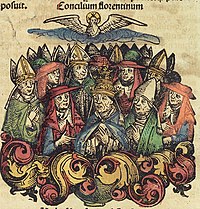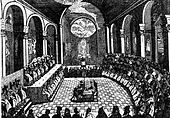
Back Konzil von Basel/Ferrara/Florenz ALS مجمع فلورنسا Arabic مجمع فلورنسا ARZ Conceyu de Basilea AST Ферара-Фларэнтыйскі сабор BE Фераро-флорентински събор Bulgarian Concili de Basilea, Ferrara i Florència Catalan Basilejsko-ferrarsko-florentský koncil Czech 17. økumeniske koncil Danish Konzil von Ferrara/Florenz German
This article includes a list of general references, but it lacks sufficient corresponding inline citations. (January 2018) |
| Council of Basel–Ferrara–Florence | |
|---|---|
 Council of Florence in the Nuremberg Chronicle (1493) | |
| Date | 1431–1449 |
Previous council | Council of Constance |
Next council | Fifth Council of the Lateran |
| Convoked by | Pope Martin V |
| President | Cardinal Julian Cesarini |
| Attendance | very light in first sessions, eventually 117 Latins and 31 Greeks |
| Topics | Hussites, East–West Schism, Western Schism |
Documents and statements | Several Papal bulls, short-lived compromise of reunion with the Eastern Orthodox Church, reunion with delegation from the Armenians |
| Chronological list of ecumenical councils | |
| Part of a series on the |
| Ecumenical councils of the Catholic Church |
|---|
 |
| 4th–5th centuries |
| 6th–9th centuries |
| 12th–14th centuries |
| 15th–16th centuries |
| 19th–20th centuries |
|
|

The Council of Florence is the seventeenth ecumenical council recognized by the Catholic Church, held between 1431 and 1449. It was covened in territories under the Holy Roman Empire. Italy became a venue of a Catholic ecumenical council after a gap of about 2 centuries (the last ecumenical council to be held in Italy was the 4th Council of the Lateran in Rome's Lateran Palace). It was convoked as the Council of Basel by Pope Martin V shortly before his death in February 1431 and took place in the context of the Hussite Wars in Bohemia and the rise of the Ottoman Empire. At stake was the greater conflict between the conciliar movement and the principle of papal supremacy.
The Council entered a second phase after Emperor Sigismund's death in 1437. Pope Eugene IV translated the Council to Ferrara on 8 January 1438, where it became the Council of Ferrara and succeeded in drawing some of the Byzantine ambassadors who were in attendance at Basel to Italy. Some Council members rejected the papal decree and remained at Basel: this rump Council suspended Eugene, declared him a heretic, and then in November 1439 elected an antipope, Felix V.
After becoming the Council of Florence (having moved to avoid the plague in Ferrara), the Council concluded in 1445 after negotiating union with the Eastern Orthodox Church. This bridging of the Great Schism proved fleeting, but was a political coup for the papacy. In 1447, Sigismund's successor Frederick III commanded the city of Basel to expel the Council of Basel; the rump Council reconvened in Lausanne before dissolving itself in 1449.